JEE Advanced Previous Year Question Paper
One of the most valuable resources on the Mockers platform is JEE Advanced previous year question paper. If you are going to appear in the second stage of the Joint Entrance Examination, then make sure to utilize these study materials to maximize your scoring potential. You can learn about question formats and styles with these PYQs and prepare yourself to deal confidently with the upcoming examination.
The subject-matter experts and professional educators of Mockers gather several previous year question papers of JEE Advanced and provide them on a single online platform. By practicing these past papers thoroughly, you can increase your conceptual knowledge and understanding of various concepts.
Important Dates For JEE Advanced
After the result of JEE Main is announced, the registration for JEE Advanced begins. The dates and information regarding JEE Advanced 2024 are described in detail below.
|
JEE ADVANCED 2024 |
|
| ACTIVITY | DAY, DATE, & TIME |
| Online Registration for JEE Advanced 2024 | Sunday, April 21, 2024 (10 am) to Tuesday, April 30, 2024 (5 pm) |
| Last Date for Application Fee Payment | Monday, May 6, 2024 (until 5 pm) |
| Admit Card Download Availability | Friday, May 17, 2024 (10 am) to Sunday, May 26, 2024 (2:30 pm) |
| Choosing of Scribe by PwD candidates/candidates with less than 40% disability and having difficulty in writing | Saturday, May 25, 2024 |
| JEE Advanced 2024 Examination | Sunday, May 26, 2024
|
| Copy of Candidates Response Sheet Release | Friday, May 31, 2024 (5 pm) |
| Online Display of Provisional Answer Keys | Sunday, June 02, 2024 (10 am) |
| Window to Challenge Answer Key | Sunday, June 02, 2024 (10 am) to Monday, June 03, 2024 (5 pm) |
| Declaration of JEE Advanced 2024 Final Answer Key and Result | Sunday, June 09, 2024 (10 am) |
| Tentative Start of Joint Seat Allocation (JoSAA) 2024 Process | Monday, June 10, 2024 |
JEE Advanced 2024 Highlights
The key points of the JEE Advanced exam are summarized in the table below. You can go through it to get a brief overview of the examination.
| PARTICULARS | DETAILS |
| Examination Name | Joint Entrance Examination (Advanced) |
| JEE Advanced 2024 Conducting Body | IIT Madras |
| Level of Exam | National-Level |
| Examination Mode | Computer-Based Test |
| Number of Papers | Two |
| Exam Duration | Total 6 hours: 3 hours for each paper |
| Language / Medium of Examination | English / Hindi |
| Official Website | www.jeeadv.ac.in |
| Contact Details | Chairperson, JEE (Advanced) 2024 IIT Madras Chennai 600036 Email: orgjee@iitm.ac.in |
Year-Wise JEE Advanced PYQ
To make your preparation very effective, our subject-matter experts provide you with a number of JEE Advanced previous year question papers. The year-wise format helps to increase your questions bank and identify the recurring patterns in JEE Advanced PYPs. With this feature on Mockers, you can solve all the questions on a single platform and prepare yourself confidently for the real exam.
JEE Advanced Previous Year Question Paper With Solutions
On the Mockers website, you can take advantage of JEE Advanced previous year question paper with solutions PDF and enhance your preparation journey. We offer all the JEE Advanced PYQs with precise and detailed explanations for each answer to the question. With this practice, you can cross-check your answers and rectify what went wrong during the problem-solving process. You will also be able to avoid similar mistakes in the actual exam.
Conditions Of Eligibility For JEE Advanced
In order to appear for the JEE Advanced, you need to fulfill each and every criterion simultaneously. We have mentioned all of them below.
Criterion 1: Performance in JEE Main
You should be among the top 2,50,000 candidates (including all categories) in the JEE Main examination.
The percentages of various candidates to be shortlisted are:
- 10% for General - Economically Weaker Section
- 27% for OBC - Non-creamy Layer
- 15% for Scheduled Caste
- 7.5% for Scheduled Tribe
- The remaining 40.5% is open to all
Within each of these five categories, a 5% reservation is available for PwD candidates.
The table below shows the order to be followed while choosing the top 2,50,000 candidates in various categories based on their performance in the B.E./ B.Tech paper of JEE Mains.
| CATEGORY-WISE DISTRIBUTION OF THE TOP 2,50,000 CANDIDATES | ||
| CATEGORY | NUMBER OF “TOP” CANDIDATES | |
| Open | 96,187 | 1,01,250 |
| Open - PwD | 5,063 | |
| Gen - EWS | 23,750 | 25,000 |
| Gen - ESW - PwD | 1,250 | |
| OBC - NCL | 64,125 | 67,500 |
| OBC - NCL - PwD | 3,375 | |
| SC | 35,625 | 37,500 |
| SC - PwD | 1,875 | |
| ST | 17,812 | 18,750 |
| ST - PwD | 938 | |
Criterion 2: Age Limit
For the JEE Advanced 2024, you should have been born on or after October 1, 1999. Five years of age relaxation is given to SC, ST, and PwD candidates. It means you should have been born on or after October 1, 1994, if you belong to these categories.
Criterion 3: Number of attempts
You can attempt the JEE Advanced examination a maximum of two times in two consecutive years.
Criterion 4: Appearance in Class 12th or equivalent exam
You must have appeared for the class 12 or equivalent examination for the first time in either the last or current year of the JEE Advanced exam with Physics, Mathematics, and Chemistry as compulsory subjects.
Criterion 5: Earlier admission at IITs’
You should not have been admitted to an IIT through Joint Seat Allocation (JoSAA) in the past year, irrespective of whether or not you continued the program or accepted an IIT seat by reporting. You will also not be eligible to appear for JEE Advanced if your admission to IITs was canceled after joining the institute for whatever reason.
You can only take the JEE Advanced examination in case you were allocated a seat but:
- did not report online or at any reporting center.
- withdrew before the last round of seat allotment.
- had your seat canceled before the last round of seat allotment for IITs.
JEE Advanced Previous Year Question Paper In Hindi
To provide you with the exact exam environment, the Mockers website has the JEE Advanced previous year question paper with solutions in the Hindi language as well. You can choose the language mode before starting to solve these online questions or switch it in between the practice if you don’t understand the question information clearly.
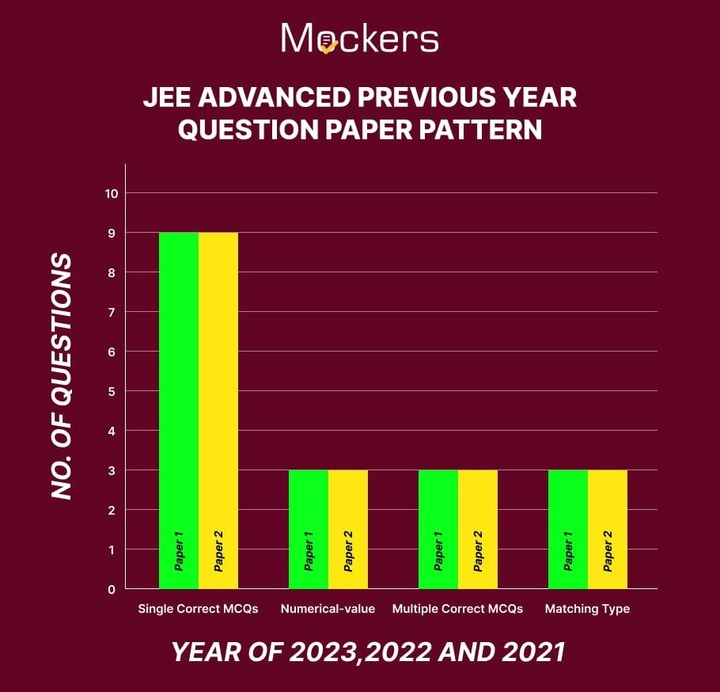
JEE Advanced Previous Year Question Paper Pattern
With the help of the image below, you can learn about the number of questions and their type included in the JEE Advanced previous year question paper of the last 3 years.
Registration Fee For JEE Advanced
If you want to take the JEE Advanced exam, then you must pay the fee, as mentioned in the following table.
|
REGISTRATION FEE FOR EXAMINATION CENTERS IN INDIA |
||
| Indian Nationals | Female Candidates (all categories) | INR 1,600 |
| SC, ST, and PwD Candidates | INR 1,600 | |
| All other Candidates | INR 3,200 | |
| Overseas Citizenship of India (OCI) / Person of Indian Origin (PIO) cardholders | Female Candidates (GEN and GEN - PwD) | INR 1,600 |
| OPEN (GEN - PwD) | INR 1,600 | |
| OPEN (GEN) | INR 3,200 | |
| Foreign Nationals and OCI / PIO cardholders | Candidates residing in SAARC (South Asian Association for Regional Cooperation) countries | USD 100 |
| Candidates residing in Non-SAARC countries | USD 200 | |
|
REGISTRATION FEE FOR EXAMINATION CENTERS IN FOREIGN COUNTRIES |
||
| Indian Nationals and OCI/PIO cardholders | All | USD 100 |
| Foreign Nationals & OCI/PIO cardholders | Candidates residing in SAARC (South Asian Association for Regional Cooperation) countries | USD 100 |
| Candidates residing in Non-SAARC countries | USD 200 | |
The registration fee shown above does not include service charges, processing fees, and any other charges that the payment gateway/banks may have. Once you have paid the registration fee, it is non-refundable and non-transferable.
JEE Advanced Previous Year Question Paper Difficulty Level Analysis
The expert team of Mockers who is responsible for collecting the data related to JEE Advanced previous year question paper from official sources has analyzed the last 7 PYPs of this exam. You can refer to the image below and learn about the difficulty level of the questions across various subjects involved in this examination.
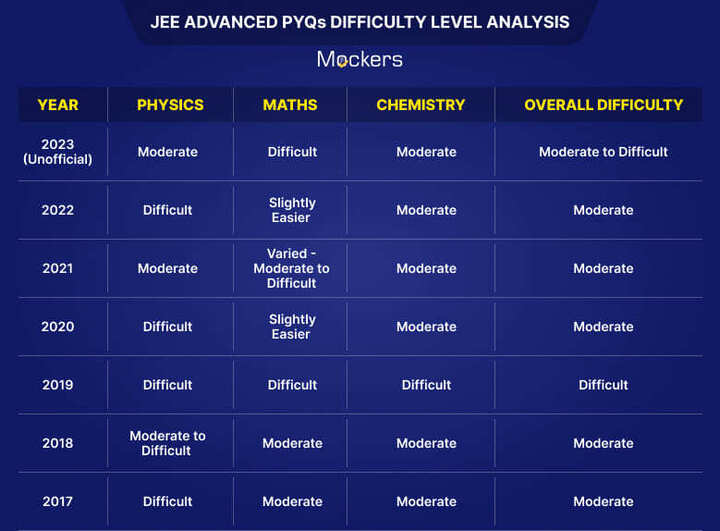
How To Solve JEE Advanced Previous Year Question Paper?
By following just a few easy steps, you can practice and solve the JEE Advanced previous year question paper PDF on the Mockers platform. For your benefit, we have mentioned all the steps in detail below.
- Firstly, ensure you have a good internet connection on your smartphone, laptop, PC, or tablet.
- Then, you can visit our website by typing www.mockers.in on your favorite search engine browser.

- Soon, our homepage will be displayed on your screen. Here, you need to click on the “Navigation” menu and select the “Exam Categories” section.

- Now, you have to locate the “Engineering” icon from the list of exam categories. Once located, tap on it and select the “JEE Main” option.

- You will be directed to a new page by the system where you have to click on the “JEE Advanced PYQs” icon.
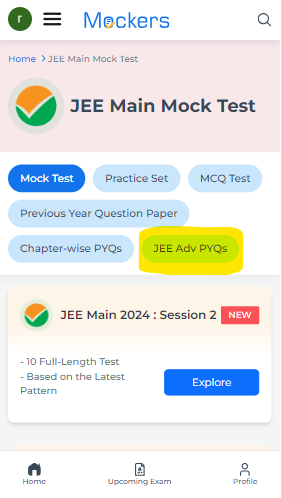
- And that’s it, you can explore any JEE Advanced previous year question paper according to your preference and start solving the questions for better preparation.
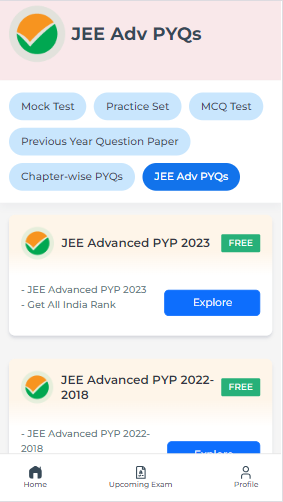
List Of Cities And Towns For JEE Advanced
We have gathered the information regarding the JEE Advanced exam centers from the official sources and described them in a tabulated format below.
| STATE / UNION TERRITORY | CITIES |
|
IIT BOMBAY ZONE |
|
| Goa | Panaji, Margao / Madgaon |
| Gujarat | Ahmedabad, Anand, Bhavnagar, Bhuj, Gandhinagar, Himatnagar, Jamnagar, Junagadh, Mehsana, Rajkot, Surat, Vadodara, Vapi, Valsad |
| Karnataka | Bagalkot, Belagavi, Bellary, Bengaluru, Davanagere, Dharwad-Hubballi, Hassan, Kalaburagi (Gulbarga), Mangaluru, Mysuru, Shivamogga, Tumakuru, Udupi/Manipal |
| Maharashtra | Ahmednagar, Akola, Amravati, Aurangabad, Bhandara, Chandrapur, Dhule, Jalgaon, Kolhapur, Latur, Mumbai, Nagpur, Nanded, Nashik, Navi Mumbai, Palghar, Pune, Raigad, Sangamner, Sangli, Satara, Solapur, Thane, Vasai, Wardha, Yavatmal |
|
IIT DELHI ZONE |
|
| Delhi / NCR | Delhi (East), Delhi (North), Delhi (South), Delhi (West), Faridabad, Noida, Gurgaon |
| Jammu and Kashmir | Jammu, Srinagar |
| Ladakh | Leh |
| Rajasthan | Ajmer, Alwar, Bhilwara, Bikaner, Hanumangarh, Jaipur, Jodhpur, Kota, Sikar, Udaipur |
|
IIT GUWAHATI ZONE |
|
| Arunachal Pradesh | Naharlagun |
| Assam | Dibrugarh, Guwahati, Jorhat, Silchar, Tezpur |
| Bihar | Arrah, Aurangabad, Bhagalpur, Darbhanga, Gaya, Muzaffarpur, Patna, Purnea, Rohtas |
| Manipur | Imphal |
| Meghalaya | Shillong |
| Mizoram | Aizawl |
| Nagaland | Kohima |
| Sikkim | Gangtok |
| Tripura | Agartala |
| West Bengal | Siliguri |
|
IIT KANPUR ZONE |
|
| Madhya Pradesh | Bhopal, Indore, Jabalpur, Sagar, Satna, Ujjain |
| Uttar Pradesh | Gorakhpur, Jhansi, Kanpur, Lucknow, Prayagraj, Varanasi |
|
IIT BHUBANESWAR ZONE |
|
| Andaman and Nicobar Islands | Port Blair |
| Andhra Pradesh | Srikakulam, Visakhapatnam, Vizianagaram |
| Chhattisgarh | Bhilai, Bilaspur, Raipur |
| Jharkhand | Dhanbad, Hazaribagh, Jamshedpur, Ranchi |
| Odisha | Balasore, Berhampur, Bhubaneswar, Cuttack, Jeypore, Rourkela, Sambalpur |
| West Bengal | Asansol, Berhampore, Burdwan, Durgapur, Kalyani (Nadia), Kharagpur - Kolaghat, Kolkata (North), Kolkata (South) |
|
IIT MADRAS ZONE |
|
| Andhra Pradesh | Amalapuram, Ananthapur, Bhimavaram, Chirala, Chittoor, Eluru, Gudlavalleru, Gudur, Guntur, Kadapa, Kakinada, Kurnool, Markapur, Mylavaram, Narasaraopet, Nellore, Ongole, Rajahmundry, Surampalem, Tadepalligudem, Tirupathi, Vijayawada |
| Kerala | Alappuzha, Kannur, Kasaragod, Kochi, Kollam, Kottayam, Kozhikode, Malappuram, Palakkad, Thiruvananthapuram, Thrissur |
| Puducherry | Puducherry |
| Tamil Nadu | Chennai, Coimbatore, Madurai, Salem, Thanjavur, Thiruchirapalli, Tirunelveli, Vellore, Nagercoil, Namakkal, Virudhnagar |
| Telangana | Adilabad, Hyderabad, Karimnagar, Khammam, Kodad, Kothagudem, Mahbubnagar, Nalgonda, Nizamabad, Sathupally, Siddipet, Suryapet, Warangal |
|
IIT ROORKEE ZONE |
|
| Chandigarh | Chandigarh |
| Haryana | Ambala, Hisar, Kurukshetra |
| Himachal Pradesh | Bilaspur, Hamirpur, Shimla, Mandi, Kangra, Pathankot |
| Madhya Pradesh | Gwalior |
| Punjab | Amritsar, Bathinda, Jalandhar, Ludhiana, Mohali, Patiala |
| Uttarakhand | Dehradun, Haldwani, Roorkee |
| Uttar Pradesh | Agra, Aligarh, Bareilly, Ghaziabad, Mathura, Meerut, Moradabad, Muzaffarnagar, Saharanpur |
JEE Advanced Examination Rank Lists
You will be considered for ranking in the JEE Advanced only after you appear in both Paper 1 and Paper 2.
- The marks you obtain in both papers will be added up for different subjects respectively.
- The aggregate marks obtained by you will be the sum of marks obtained in Physics, Chemistry, and Maths. Then, the rank lists will be prepared based on the aggregate marks in JEE Advanced.
- Only if you score the minimum prescribed marks in each subject and also in the aggregate, will you be included in the rank list.
- You can check out the image below and learn about the minimum percentage of marks required for different categories.
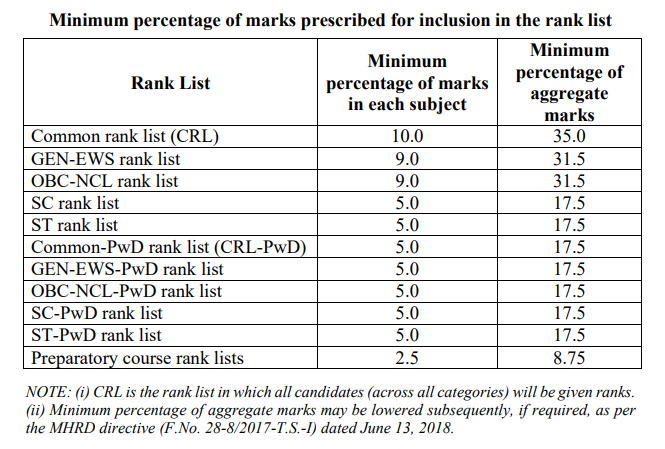
Courses Offered By IITs Through JEE Advanced Examination
You can get enrolled in any engineering college across India by scoring well in the JEE Advanced exam. But, the Indian Institutes of Technology are the most premium engineering institutes for higher education. In the table below, we have gathered information regarding the courses offered by various IITs through this examination.
| Maja INSTITUTION NAME | COURSE NAME |
| Indian Institute of Technology, Delhi | Biotechnology and Biochemical Engineering (B.Tech) - 4 years |
| Chemical Engineering (B.Tech) - 4 years | |
| Civil Engineering (B.Tech) - 4 years | |
| Computer Science and Engineering (B.Tech) - 4 years | |
| Electrical Engineering (B.Tech) - 4 years | |
| Electrical Engineering (Power and Automation) (B.Tech) - 4 years | |
| Engineering Physics (B.Tech) - 4 years | |
| Mathematics and Computing (B.Tech) - 4 years | |
| Mechanical Engineering (B.Tech) - 4 years | |
| Production and Industrial Engineering (B.Tech) - 4 years | |
| Textile Technology (B.Tech) - 4 years | |
| Engineering and Computational Mechanics (B.Tech) - 4 years | |
| Materials Engineering (B.Tech) - 4 years | |
| Energy Engineering (B.Tech) - 4 years | |
| Chemical Engineering (B.Tech and M.Tech - Dual Degree) - 5 years | |
| Computer Science and Engineering (B.Tech and M.Tech - Dual Degree) - 5 years | |
| Mathematics and Computing (B.Tech and M.Tech - Dual Degree) - 5 years | |
| Indian Institute of Technology, Bombay | Aerospace Engineering (B.Tech) - 4 years |
| Chemical Engineering (B.Tech) - 4 years | |
| Civil Engineering (B.Tech) - 4 years | |
| Environmental Science and Engineering (B.Tech) - 4 years | |
| Computer Science and Engineering (B.Tech) - 4 years | |
| Electrical Engineering (B.Tech) - 4 years | |
| Engineering Physics (B.Tech) - 4 years | |
| Mechanical Engineering (B.Tech) - 4 years | |
| Metallurgical Engineering and Material Science (B.Tech) - 4 years | |
| Energy Engineering (B.Tech) - 4 years | |
| Chemistry (B.Sc) - 4 years | |
| Economics (B.Sc) - 4 years | |
| BS in Mathematics (B.Sc) - 4 years | |
| Electrical Engineering (B.Tech and M.Tech - Dual Degree) - 5 years | |
| Indian Institute of Technology, Indore | Chemical Engineering (B.Tech) - 4 years |
| Civil Engineering (B.Tech) - 4 years | |
| Computer Science and Engineering (B.Tech) - 4 years | |
| Electrical Engineering (B.Tech) - 4 years | |
| Engineering Physics (B.Tech) - 4 years | |
| Space Sciences and Engineering (B.Tech) - 4 years | |
| Mathematics and Computing (B.Tech) - 4 years | |
| Mechanical Engineering (B.Tech) - 4 years | |
| Metallurgical Engineering and Material Science (B.Tech) - 4 years | |
| Indian Institute of Technology, Bhubaneswar | Civil Engineering (B.Tech) - 4 years |
| Computer Science and Engineering (B.Tech) - 4 years | |
| Electrical Engineering (B.Tech) - 4 years | |
| Electronics and Communication Engineering (B.Tech) - 4 years | |
| Mechanical Engineering (B.Tech) - 4 years | |
| Metallurgical and Materials Engineering (B.Tech) - 4 years | |
| Computer Science and Engineering (B.Tech and M.Tech - Dual Degree) - 5 years | |
| Metallurgical and Materials Engineering (B.Tech and M.Tech - Dual Degree) - 5 years | |
| Electrical Engineering and M.Tech Power Electronics and Drives (B.Tech and M.Tech - Dual Degree) - 5 years | |
| Civil Engineering and M.Tech in Transportation Engineering (B.Tech and M.Tech - Dual Degree) - 5 years | |
| Mechanical Engineering and M.Tech in Mechanical System Design (B.Tech and M.Tech - Dual Degree) - 5 years | |
| Mechanical Engineering and M.Tech in Thermal Science & Engineering (B.Tech and M.Tech - Dual Degree) - 5 years | |
| Civil Engineering and M.Tech in Structural Engineering (B.Tech and M.Tech - Dual Degree) - 5 years | |
| Mechanical Engineering with M.Tech in Manufacturing Engineering (B.Tech and M.Tech - Dual Degree) - 5 years | |
| Civil Engineering and M.Tech in Environmental Engineering (B.Tech and M.Tech - Dual Degree) - 5 years | |
| Indian Institute of Technology, Mandi | Civil Engineering (B.Tech) - 4 years |
| General Engineering (B.Tech) - 4 years | |
| Computer Science and Engineering (B.Tech) - 4 years | |
| Electrical Engineering (B.Tech) - 4 years | |
| Engineering Physics (B.Tech) - 4 years | |
| Materials Science and Engineering (B.Tech) - 4 years | |
| Microelectronics and VLSI (B.Tech) - 4 years | |
| Mathematics and Computing (B.Tech) - 4 years | |
| Mechanical Engineering (B.Tech) - 4 years | |
| Bio Engineering (B.Tech) - 4 years | |
| Data Science and Engineering (B.Tech) - 4 years | |
| BS in Chemical Sciences (B.Sc) - 4 years | |
| Indian Institute of Technology, Hyderabad | Chemical Engineering (B.Tech) - 4 years |
| Civil Engineering (B.Tech) - 4 years | |
| Computational Engineering (B.Tech) - 4 years | |
| Industrial Chemistry (B.Tech) - 4 years | |
| Electrical Engineering (IC Design and Technology) (B.Tech) - 4 years | |
| Computer Science and Engineering (B.Tech) - 4 years | |
| Electrical Engineering (B.Tech) - 4 years | |
| Engineering Physics (B.Tech) - 4 years | |
| Engineering Science (B.Tech) - 4 years | |
| Mathematics and Computing (B.Tech) - 4 years | |
| Mechanical Engineering (B.Tech) - 4 years | |
| Materials Science and Metallurgical Engineering (B.Tech) - 4 years | |
| Artificial Intelligence (B.Tech) - 4 years | |
| Biomedical Engineering (B.Tech) - 4 years | |
| Biotechnology and Bioinformatics (B.Tech) - 4 years | |
| Indian Institute of Technology, Madras | Aerospace Engineering (B.Tech) - 4 years |
| Chemical Engineering (B.Tech) - 4 years | |
| Civil Engineering (B.Tech) - 4 years | |
| Computer Science and Engineering (B.Tech) - 4 years | |
| Electrical Engineering (B.Tech) - 4 years | |
| Engineering Physics (B.Tech) - 4 years | |
| Biological Engineering (B.Tech) - 4 years | |
| Mechanical Engineering (B.Tech) - 4 years | |
| Metallurgical and Materials Engineering (B.Tech) - 4 years | |
| Naval Architecture and Ocean Engineering (B.Tech) - 4 years | |
| Biological Science (B.Sc) - 4 years | |
| Aerospace Engineering (B.Tech and M.Tech - Dual Degree) - 5 years | |
| Engineering Design (B.Tech and M.Tech - Dual Degree) - 5 years | |
| Physics (B.Sc and M.Sc - Dual Degree) - 5 years | |
| Indian Institute of Technology, Jodhpur | Chemical Engineering (B.Tech) - 4 years |
| Computer Science and Engineering (B.Tech) - 4 years | |
| Electrical Engineering (B.Tech) - 4 years | |
| Mechanical Engineering (B.Tech) - 4 years | |
| Civil and Infrastructure Engineering (B.Tech) - 4 years | |
| Bio Engineering (B.Tech) - 4 years | |
| Artificial Intelligence and Data Science (B.Tech) - 4 years | |
| Materials Engineering (B.Tech) - 4 years | |
| Physics with Specialization (B.Sc) - 4 years | |
| Chemistry with Specialization (B.Sc) - 4 years | |
| Indian Institute of Technology, Ropar | Chemical Engineering (B.Tech) - 4 years |
| Civil Engineering (B.Tech) - 4 years | |
| Computer Science and Engineering (B.Tech) - 4 years | |
| Electrical Engineering (B.Tech) - 4 years | |
| Engineering Physics (B.Tech) - 4 years | |
| Artificial Intelligence and Data Engineering (B.Tech) - 4 years | |
| Mathematics and Computing (B.Tech) - 4 years | |
| Mechanical Engineering (B.Tech) - 4 years | |
| Metallurgical and Materials Engineering (B.Tech) - 4 years | |
| Indian Institute of Technology, Guwahati | Chemical Engineering (B.Tech) - 4 years |
| Chemical Science and Technology (B.Tech) - 4 years | |
| Civil Engineering (B.Tech) - 4 years | |
| Computer Science and Engineering (B.Tech) - 4 years | |
| Electronics and Communication Engineering (B.Tech) - 4 years | |
| Electronics and Electrical Engineering (B.Tech) - 4 years | |
| Engineering Physics (B.Tech) - 4 years | |
| Mathematics and Computing (B.Tech) - 4 years | |
| Mechanical Engineering (B.Tech) - 4 years | |
| Data Science and Artificial Intelligence (B.Tech) - 4 years | |
| Biosciences and Bioengineering (B.Tech) - 4 years | |
| Energy Engineering (B.Tech) - 4 years | |
| Indian Institute of Technology, Kharagpur | Aerospace Engineering (B.Tech) - 4 years |
| Agricultural and Food Engineering (B.Tech) - 4 years | |
| Biotechnology and Biochemical Engineering (B.Tech) - 4 years | |
| Chemical Engineering (B.Tech) - 4 years | |
| Civil Engineering (B.Tech) - 4 years | |
| Computer Science and Engineering (B.Tech) - 4 years | |
| Electrical Engineering (B.Tech) - 4 years | |
| Electronics and Electrical Communication Engineering (B.Tech) - 4 years | |
| Instrumentation Engineering (B.Tech) - 4 years | |
| Manufacturing Science and Engineering (B.Tech) - 4 years | |
| Mechanical Engineering (B.Tech) - 4 years | |
| Metallurgical and Materials Engineering (B.Tech) - 4 years | |
| Mining Engineering (B.Tech) - 4 years | |
| Ocean Engineering and Naval Architecture (B.Tech) - 4 years | |
| Industrial and Systems Engineering (B.Tech) - 4 years | |
| Chemistry (B.Sc) - 4 years | |
| Economics (B.Sc) - 4 years | |
| Physics (B.Sc) - 4 years | |
| Mathematics and Computing (B.Sc) - 4 years | |
| Applied Geology (B.Sc) - 4 years | |
| Exploration Physics (B.Sc) - 4 years | |
| Architecture (B.Arch) - 5 years | |
| Aerospace Engineering (B.Tech and M.Tech - Dual Degree) - 5 years | |
| Agricultural and Food Engineering with M.Tech in any of the listed specializations (B.Tech and M.Tech - Dual Degree) - 5 years | |
| Biotechnology and Biochemical Engineering (B.Tech and M.Tech - Dual Degree) - 5 years | |
| Civil Engineering with any of the listed specialization (B.Tech and M.Tech - Dual Degree) - 5 years | |
| Computer Science and Engineering (B.Tech and M.Tech - Dual Degree) - 5 years | |
| Electrical Engineering with M.Tech in any of the listed specializations (B.Tech and M.Tech - Dual Degree) - 5 years | |
| Electronics and Electrical Communication Engineering with M.Tech in any of the listed specializations (B.Tech and M.Tech - Dual Degree) - 5 years | |
| Mechanical Engineering with M.Tech in any of the listed specializations (B.Tech and M.Tech - Dual Degree) - 5 years | |
| Industrial and Systems Engineering with M.Tech in Industrial and Systems Engineering and Management (B.Tech and M.Tech - Dual Degree) - 5 years | |
| Metallurgical and Materials Engineering (B.Tech and M.Tech - Dual Degree) - 5 years | |
| Mining Engineering (B.Tech and M.Tech - Dual Degree) - 5 years | |
| Mining Safety Engineering (B.Tech and M.Tech - Dual Degree) - 5 years | |
| Ocean Engineering and Naval Architecture (B.Tech and M.Tech - Dual Degree) - 5 years | |
| Manufacturing Science and Engineering with M.Tech in Industrial and Systems Engineering and Management (B.Tech and M.Tech - Dual Degree) - 5 years | |
| Indian Institute of Technology, Kanpur | Aerospace Engineering (B.Tech) - 4 years |
| Biological Sciences and Bioengineering (B.Tech) - 4 years | |
| Chemical Engineering (B.Tech) - 4 years | |
| Civil Engineering (B.Tech) - 4 years | |
| Computer Science and Engineering (B.Tech) - 4 years | |
| Electrical Engineering (B.Tech) - 4 years | |
| Materials Science and Engineering (B.Tech) - 4 years | |
| Mechanical Engineering (B.Tech) - 4 years | |
| Chemistry (B.Sc) - 4 years | |
| Economics (B.Sc) - 4 years | |
| Mathematics and Scientific Computing (B.Sc) - 4 years | |
| Physics (B.Sc) - 4 years | |
| Earth Sciences (B.Sc) - 4 years | |
| Statistics and Data Science (B.Sc) - 4 years | |
| Indian Institute of Technology, Gandhinagar | Chemical Engineering (B.Tech) - 4 years |
| Civil Engineering (B.Tech) - 4 years | |
| Computer Science and Engineering (B.Tech) - 4 years | |
| Electrical Engineering (B.Tech) - 4 years | |
| Mechanical Engineering (B.Tech) - 4 years | |
| Artificial Intelligence (B.Tech) - 4 years | |
| Materials Engineering (B.Tech) - 4 years | |
| Computer Science and Engineering (B.Tech and M.Tech - Dual Degree) - 5 years | |
| Electrical Engineering (B.Tech and M.Tech - Dual Degree) - 5 years | |
| Mechanical Engineering (B.Tech and M.Tech - Dual Degree) - 5 years | |
| Indian Institute of Technology, Roorkee | Chemical Engineering (B.Tech) - 4 years |
| Civil Engineering (B.Tech) - 4 years | |
| Computer Science and Engineering (B.Tech) - 4 years | |
| Electrical Engineering (B.Tech) - 4 years | |
| Electronics and Communication Engineering (B.Tech) - 4 years | |
| Engineering Physics (B.Tech) - 4 years | |
| Mechanical Engineering (B.Tech) - 4 years | |
| Metallurgical and Materials Engineering (B.Tech) - 4 years | |
| Production and Industrial Engineering (B.Tech) - 4 years | |
| Data Science and Artificial Intelligence (B.Tech) - 4 years | |
| Biosciences and Bioengineering (B.Tech) - 4 years | |
| Architecture (B.Arch) - 5 years | |
| Geological Technology (Integrated M.Tech) - 5 years | |
| Geophysical Technology (Integrated M.Tech) - 5 years | |
| Physics (B.Sc and M.Sc - Dual Degree) - 5 years | |
| Mathematics and Computing (B.Sc and M.Sc - Dual Degree) - 5 years | |
| Chemical Sciences (B.Sc and M.Sc - Dual Degree) - 5 years | |
| Economics (B.Sc and M.Sc - Dual Degree) - 5 years | |
| Indian Institute of Technology, Dharwad | Chemical and Biochemical Engineering (B.Tech) - 4 years |
| Computer Science and Engineering (B.Tech) - 4 years | |
| Electrical Engineering (B.Tech) - 4 years | |
| Engineering Physics (B.Tech) - 4 years | |
| Mathematics and Computing (B.Tech) - 4 years | |
| Mechanical Engineering (B.Tech) - 4 years | |
| Civil and Infrastructure Engineering (B.Tech) - 4 years | |
| Interdisciplinary Sciences (B.Sc and M.Sc - Dual Degree) - 5 years | |
| Indian Institute of Technology, Bhilai | Computer Science and Engineering (B.Tech) - 4 years |
| Electrical Engineering (B.Tech) - 4 years | |
| Mechanical Engineering (B.Tech) - 4 years | |
| Materials Science and Metallurgical Engineering (B.Tech) - 4 years | |
| Mechatronics Engineering (B.Tech) - 4 years | |
| Data Science and Artifical Intelligence (B.Tech) - 4 years | |
| Indian Institute of Technology, Palakkad | Civil Engineering (B.Tech) - 4 years |
| Computer Science and Engineering (B.Tech) - 4 years | |
| Electrical Engineering (B.Tech) - 4 years | |
| Mechanical Engineering (B.Tech) - 4 years | |
| Data Science and Engineering (B.Tech) - 4 years | |
| Indian Institute of Technology, Jammu | Chemical Engineering (B.Tech) - 4 years |
| Civil Engineering (B.Tech) - 4 years | |
| Computer Science and Engineering (B.Tech) - 4 years | |
| Electrical Engineering (B.Tech) - 4 years | |
| Mathematics and Computing (B.Tech) - 4 years | |
| Mechanical Engineering (B.Tech) - 4 years | |
| Materials Engineering (B.Tech) - 4 years | |
| Indian Institute of Technology, Goa | Computer Science and Engineering (B.Tech) - 4 years |
| Electrical Engineering (B.Tech) - 4 years | |
| Mathematics and Computing (B.Tech) - 4 years | |
| Mechanical Engineering (B.Tech) - 4 years | |
| Indian Institute of Technology, Tirupati | Chemical Engineering (B.Tech) - 4 years |
| Civil Engineering (B.Tech) - 4 years | |
| Computer Science and Engineering (B.Tech) - 4 years | |
| Electrical Engineering (B.Tech) - 4 years | |
| Mechanical Engineering (B.Tech) - 4 years | |
| Indian Institute of Technology, Patna | Chemical Engineering (B.Tech) - 4 years |
| Chemical Science and Technology (B.Tech) - 4 years | |
| Civil Engineering (B.Tech) - 4 years | |
| Computer Science and Engineering (B.Tech) - 4 years | |
| Electronics and Communication Engineering (B.Tech) - 4 years | |
| Engineering Physics (B.Tech) - 4 years | |
| Mathematics and Computing (B.Tech) - 4 years | |
| Mechanical Engineering (B.Tech) - 4 years | |
| Metallurgical and Materials Engineering (B.Tech) - 4 years | |
| Electrical and Electronics Engineering (B.Tech) - 4 years | |
| Artificial Intelligence and Data Science (B.Tech) - 4 years | |
| B.Tech in Electronics and Communication Engineering and M.Tech in Communication Systems (B.Tech and M.Tech - Dual Degree) - 5 years | |
| Indian Institute of Technology, (ISM) Dhanbad | Chemical Engineering (B.Tech) - 4 years |
| Civil Engineering (B.Tech) - 4 years | |
| Computer Science and Engineering (B.Tech) - 4 years | |
| Electrical Engineering (B.Tech) - 4 years | |
| Electronics and Communication Engineering (B.Tech) - 4 years | |
| Engineering Physics (B.Tech) - 4 years | |
| Environmental Engineering (B.Tech) - 4 years | |
| Mechanical Engineering (B.Tech) - 4 years | |
| Mining Engineering (B.Tech) - 4 years | |
| Mining Machinery Engineering (B.Tech) - 4 years | |
| Petroleum Engineering (B.Tech) - 4 years | |
| Mineral and Metallurgical Engineering (B.Tech) - 4 years | |
| Mathematics and Computing (Integrated M.Tech) - 5 years | |
| Applied Geology (Integrated M.Tech) - 5 years | |
| Applied Geophysics (Integrated M.Tech) - 5 years= | |
| Indian Institute of Technology, (BHU) Varanasi | Ceramic Engineering (B.Tech) - 4 years |
| Chemical Engineering (B.Tech) - 4 years | |
| Civil Engineering (B.Tech) - 4 years | |
| Computer Science and Engineering (B.Tech) - 4 years | |
| Electrical Engineering (B.Tech) - 4 years | |
| Electronics Engineering (B.Tech) - 4 years | |
| Mechanical Engineering (B.Tech) - 4 years | |
| Metallurgical Engineering (B.Tech) - 4 years | |
| Mining Engineering (B.Tech) - 4 years | |
| Pharmaceutical Engineering and Technology (B.Tech) - 4 years | |
| Architecture (B.Arch) - 5 years | |
| Biochemical Engineering with M.Tech in Biochemical Engineering and Biotechnology (B.Tech and M.Tech - Dual Degree) - 5 years | |
| Bioengineering and Biomedical Technology (B.Tech and M.Tech - Dual Degree) - 5 years | |
| Ceramic Engineering (B.Tech and M.Tech - Dual Degree) - 5 years | |
| Civil Engineering (B.Tech and M.Tech - Dual Degree) - 5 years | |
| Computer Science and Engineering (B.Tech and M.Tech - Dual Degree) - 5 years | |
| Electrical Engineering and Power Electronics (B.Tech and M.Tech - Dual Degree) - 5 years | |
| Materials Science and Technology (B.Tech and M.Tech - Dual Degree) - 5 years | |
| Mechanical Engineering (B.Tech and M.Tech - Dual Degree) - 5 years | |
| Metallurgical Engineering (B.Tech and M.Tech - Dual Degree) - 5 years | |
| Mining Engineering (B.Tech and M.Tech - Dual Degree) - 5 years | |
| Mathematics and Computing (B.Tech and M.Tech - Dual Degree) - 5 years | |
| Engineering Physics (B.Tech and M.Tech - Dual Degree) - 5 years | |
| Industrial Chemistry (B.Tech and M.Tech - Dual Degree) - 5 years | |
| Pharmaceutical Engineering and Technology (B.Tech and M.Tech - Dual Degree) - 5 years |
Memorizing the JEE Advanced PYQ with solutions is not an effective strategy. You should focus on understanding the concepts and logic behind the solutions. This will help you tackle similar problems even if they appear differently in the actual question paper.
 Bank
Bank







 SSC
SSC









 Railway
Railway







 State
State




 Other
Other


 Teaching
Teaching




 Insurance
Insurance


 Medical
Medical



 Engineering
Engineering




















 Defence
Defence





 GATE
GATE





 NTA CUET
NTA CUET

 UPSC
UPSC

 MBA Entrance
MBA Entrance








 LAW
LAW

 BITSAT 2025
BITSAT 2025
 CUET UG 2025
CUET UG 2025
 RRB NTPC 2024-25
RRB NTPC 2024-25
 Railway Group D 2025
Railway Group D 2025
 Bihar Police Constable 2025
Bihar Police Constable 2025
 RRB ALP CBT-I 2025
RRB ALP CBT-I 2025













 Get latest Exam Updates
Get latest Exam Updates 



